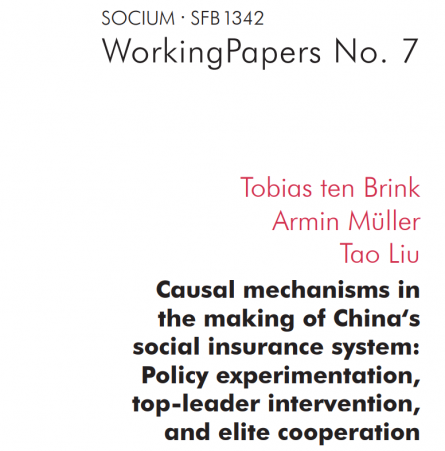
Since the initiation of reform and opening policies, social protection for urban workers in the People’s Republic of China has transformed massively. Before the 1980s, state-owned enterprises were responsible for protecting workers from social risks such as old age, accidents, and illness. Today, these three areas are organized as contribution-based social insurance systems with Chinese characteristics.
In their paper "Causal mechanisms in the making of China‘s social insurance system: Policy experimentation, topleader intervention, and elite cooperation" Tobias ten Brink, Armin Müller and Tao Liu identifie the causal mechanisms that led to the introduction of insurance schemes in the 1990s and early 2000s. they find three causal mechanisms: (neutral and strategic) policy experimentation, top-leader intervention, and (consensus-based and enforced) elite cooperation. Moreover, the thre authors demonstrate that the presence or absence of complementarity between the international environment and the domestic actor constellation had a decisive effect on how those mechanisms played out in the policy fields of urban pension, health and work accident insurance.
"Causal mechanisms in the making of China‘s social insurance system: Policy experimentation, topleader intervention, and elite cooperation" is the seventh Socium SFB 1342 Working Paper that has been published since October 2019.
Contact:
Prof. Dr. Tao Liu
Dr. Armin Müller
CRC 1342: Global Dynamics of Social Policy, Research IV and China Global Center
Campus Ring 1
28759 Bremen
Phone: +49 421 200-3473
E-Mail: armmueller@constructor.university
Prof. Dr. Tobias ten Brink
CRC 1342: Global Dynamics of Social Policy, Research IV and China Global Center
Campus Ring 1
28759 Bremen
Phone: +49 421 200-3382
E-Mail: ttenbrink@constructor.university










